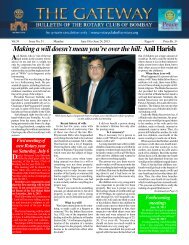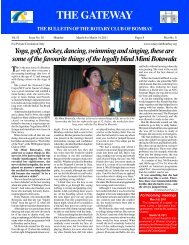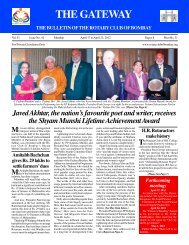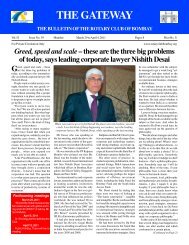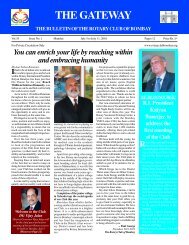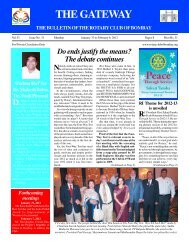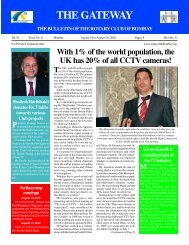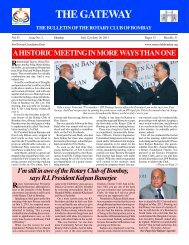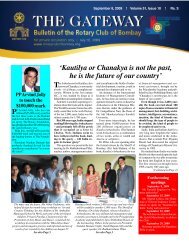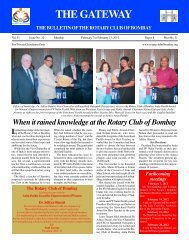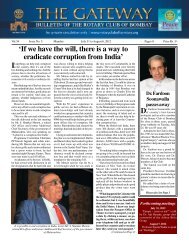Gateway 080211.pmd - Rotary Club of Bombay
Gateway 080211.pmd - Rotary Club of Bombay
Gateway 080211.pmd - Rotary Club of Bombay
- No tags were found...
Create successful ePaper yourself
Turn your PDF publications into a flip-book with our unique Google optimized e-Paper software.
Diplomacy had played a key role in preventing furtherattacks after 26/11, claims Shashi Tharoor(Continued from Page 2)Returning to the theme that he hadset out with, that is, the security andprosperity <strong>of</strong> its people, Mr. Tharoorsaid India’s biggest external menaceremained the export <strong>of</strong> terrorism froma neighbouring country.In the aftermath <strong>of</strong> the horrificevents <strong>of</strong> 26/11, he said, the governmenthad been wise in not heedingimpetuous calls for some kind <strong>of</strong> retaliatorystrike on Pakistan. Thatwould at best have destroyed a fewtraining camps which would havebeen reassembled in a matter <strong>of</strong>weeks. But it would have had a farmore calamitous impact on the Indianeconomy.“Investors don’t want to come intoa war zone. And we, as I said earlier,should be far more concerned aboutour economic well-being than aboutthe momentary gratification <strong>of</strong> hittingan elusive target in a neighbouringcountry.”On the other hand, India had shownits diplomatic resolve by turning onthe heat by all available means,whether at the UN, in its sanctionscommittee and its counter-terrorismcommittee, or through bilateral relationswith Pakistan’s biggest ally, theUnited States. India had, indeed,turned the heat on Pakistan.There had been no attack since 26/11, save the blasts at the German bakeryin Pune which appeared to be aone-<strong>of</strong>f thing not planned on the scale<strong>of</strong> 26/11. Thus, diplomacy had playeda key role in preventing further attacksby making it clear that the price forPakistan <strong>of</strong> condoning or permittingsuch attacks would be an extremelyhigh one to pay internationally.Mr. Tharoor said India’s “toughneighbourhood” appeared more reasonablethan it had been a few yearsago. Sri Lanka, which had been in thethroes <strong>of</strong> bitter strife, had seen theend <strong>of</strong> its civil war. Bangladesh, whichwas faced with a military coup, hadhad a democratic election, the return<strong>of</strong> the army to its barracks and theinstallation <strong>of</strong> a government sympatheticto India.In the Maldives, where an unpopularPresident had jailed his opponent,a free election had seen thejailed person being sworn in as President.Nepal was confronted with aMaoist insurrection, but things hadcooled down. Although it was not yetstrife-free, there had been no revival<strong>of</strong> violence and India was playing anactive role in trying to ensure a seamlesstransition to full-fledged normalcy,with the Maoists accommodatedwithin the political structure.To the north, Afghanistan had seenanother election, albeit a contestedone, but it seemed that the developmentworks India had done there hadnot gone unappreciated.“Our only problem remains withPakistan and that’s an indefinite problem.Our foreign policy will have totake this fundamental reality into account,that there are at best going to bespasms <strong>of</strong> uneasy peace between us –a cold peace; it’s never going to beparticularly pleasant because we haveone fundamental conundrum, the differencebetween our two societies.“In India, the state has an army, inPakistan, the army has a state. Andthe army in Pakistan commands agreater share <strong>of</strong> national resourcesthan any army. They expend a largerpercentage <strong>of</strong> the country’s GDP thanany army in the world. You don’tjoin the army in Pakistan to defendthe country, you join it to run thecountry.“Not only has the army controlledthe government for 32 out <strong>of</strong> 63 yearssince independence, but during theremaining 31 years it has been pullingthe strings, drawing the red lines,telling the civilian governments howfar they can or cannot go. Not onecivilian government in the history <strong>of</strong>Pakistan has completed a term <strong>of</strong> <strong>of</strong>ficebecause the military has alwaysstepped in to take back the reins <strong>of</strong>power.”Mr. Tharoor pointed out that Pakistanisociety was run by the militarywhich was so comfortably ensconcedthat it was unlikely to everdesire peace or normal relations withIndia – unless that country’s societychanged so fundamentally that itsmilitary was firmly put in place.But that was a pipedream. Electedgovernments lived in constant fear <strong>of</strong>the army which always got its way.The best India could hope for was acold peace, something it would be ableto manage with its diplomatic skills.Turning to China, Mr. Tharoor saidthe media <strong>of</strong>ten propagated worryingstories about developments on theborder, China’s claims on ArunachalPradesh and the bellicose statementsmade by the Chinese.India had a long, unresolved borderdispute which could have beensettled under Deng Xiao-Ping, but thethen Indian leadership was not confidentthat it would be able to sell thesettlement to the people. Today’sleadership was prepared to settle thedispute, but China did not appear tobe keen. Perhaps it wanted to retainit as an issue with which to occasionallyharangue India.The “incidents” highlighted by themedia were not really serious. Chinacontinued to maintain its claims toArunachal Pradesh, but India hadstood its ground. It had conductedelections in Arunachal Pradesh; thePrime Minister had visited and campaignedin the State; and the DalaiLama, despite dire Chinese warnings,had also gone there. India had stoodfirm, without being too belligerent,about its sovereign rights over its territory.That was not going to change.In the meanwhile, said Dr. Tharoor,trade had grown to $51 billion in thelast financial year and could touch $60billion this year. Although the balance<strong>of</strong> trade was overwhelmingly in China’sfavour, India was pushing away at thenon-tariff barriers that made it difficultfor Indians and Indian companiesto access Chinese markets.Many Chinese companies werebidding for power, construction andother projects in India. There were7,000 Indian students in China andtheir number was growing. The annualpilgrimage to Kailash andMansarovar in China was a success.What was lacking was a steady flowinto India <strong>of</strong> Chinese tourists whowere doing wonders for the economies<strong>of</strong> Thailand and Singapore.“I think we must encourage moreChinese investments in India, becausethe higher the stake that China has inthe success <strong>of</strong> the Indian economy,the less likely it is that somebody inBeijing will say or do things that willdisrupt the growth or success <strong>of</strong> oureconomy.“So, I come back to the economy...India has become a force to reckonwith in the world. There are not toomany countries which have received<strong>of</strong>ficial visits from the Presidents orPrime Ministers <strong>of</strong> all five permanentmembers <strong>of</strong> the UN SecurityCouncil in one calendar year, as wedid last year. That attention, that respect,is going to ensure that we continueto make the kind <strong>of</strong> impact thatwe are capable <strong>of</strong> making in the world.“The India that I believe in and Iam proud to have come back to serve,is an India that should be unafraid <strong>of</strong>the prowess or the products <strong>of</strong> theoutside world; that is confident aboutits place in the world and about itsneed to liberate the creative energies<strong>of</strong> its own people; to give them opportunitiesto advance, to build decentlives for themselves, and at thesame time to set an example in ourneighbourhood and elsewhere for thesuccessful, democratic management<strong>of</strong> diversity which is something thatI believe we are doing effectively,”Mr. Tharoor concluded.Answering questions, he told PPArvind Jolly that the rebellious developmentsin Tunisia and Egypt werethe result <strong>of</strong> authoritarian rule compoundedby economic failure. This wasa virus that bore ominous portents forall countries, especially in the Arabworld where “sclerotic regimes” hadrefused to change for several decadesand which had failed to maintain theirconcord with the people.Other countries that could facesimilar problems were Yemen,Libya, Jordan and Sudan (where thesouth had already voted overwhelminglyin a referendum to part fromthe North).Mr. Tharoor said the fears expressedby the West about the existingArab regimes being supplanted byIslamist extremists were unfounded.The “voices <strong>of</strong> the opposition”emerging in Egypt (in the shape <strong>of</strong>ElBaradei) and Tunisia were as moderateas the Islamist parties rulingTurkey.He also answered questions posedby Shailesh Haribhakti, Dr. ShaileshRaina, Dr. Aashish Contractor, PDGManibhai Doshi, Pr<strong>of</strong>. Rohini Chowgule,two Rotaractors and two VisitingRotarians.Mr. Tharoor assailed as a shameful,craven act the episode <strong>of</strong> 1999when India released terrorists in orderto save the hostages hijacked toKandahar in Afghanistan.What got his goat was the factthat the then Foreign Minister hadgone on the flight that carried thereleased terrorists to (and whichbrought back the hostages from)Afghanistan. He decried the middleclass “vote bank” politics behind thedecision to release the terrorists tosave the hostages.He lauded the act <strong>of</strong> the Indiangovernment in sending troops to helpput down an attempted coup in theMaldives in 1995. The then President(who had been ousted recently)was a reliable friend <strong>of</strong> India. Withinhours, India flew in paratroopers whoattacked the coup leaders, took overthe country and handed it back to thelegitimate authorities.(Continued on Page 7)February 8 to February 14, 2011 THE GATEWAY, The Bulletin <strong>of</strong> the <strong>Rotary</strong> <strong>Club</strong> <strong>of</strong> <strong>Bombay</strong> Page 6



